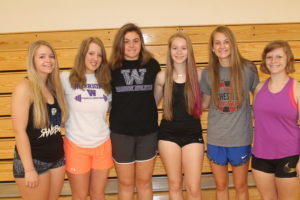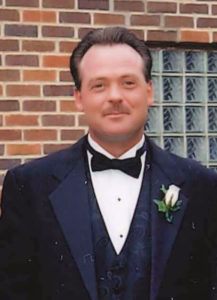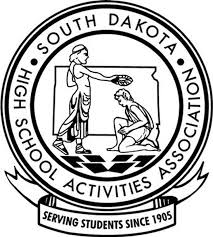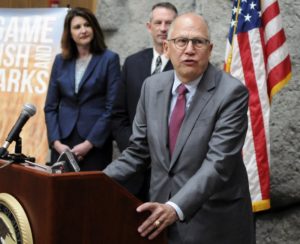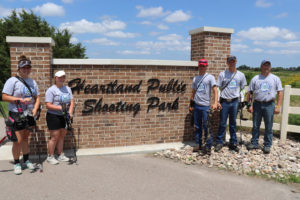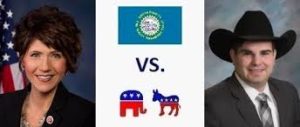
By Dana Hess
For the S.D. Newspaper Association
BROOKINGS — Task forces delving into open government issues have been appointed by various elected leaders the past 20 years, but that practice would stop if U.S. Rep. Kristi Noem is elected governor.
“My goal is not going to be to create new task forces,” said Noem, the Republican candidate for governor, who noted that there are 130 state boards and commissions. “I think we can utilize their resources and get the people that we need participating in those to where we don’t need to create another layer of bureaucracy to get the decisions that we need to serve the people of South Dakota.”
Her Democratic opponent, State Sen. Billie Sutton, embraced the use of a task force which in the past has brought together representatives of the media, law enforcement, local government, the judiciary and others to find common ground on proposed legislation.
“When the law needs to be changed, I think we need a task force approach to move the ball so everybody’s on the same page and we’re all communicating what makes sense,” Sutton said.
The two candidates made their remarks to members of the South Dakota Newspaper Association First Amendment Committee and the SDNA Board of Directors. The gubernatorial candidates were questioned in separate interviews about their views concerning open meetings and open records laws in South Dakota.
Noem assured newspaper editors and publishers that the lack of a new open government task force would not result in a lack of input from their industry. She explained that talking to stakeholders was the way her congressional office operates before proposing legislation.
“I would not begin to start pushing a lot of these other transparency initiatives until we had you guys in the loop,” Noem said. “That’s just been our normal, standard operating procedure for the last eight years.”
The candidates also differed on their approach to the open records exception that keeps government correspondence, including emails, from public disclosure.
“I think a presumption of openness as it pertains to emails is a good step,” Sutton said. “That is definitely something I want to do.”
Noem said she was concerned about the protection of personal information that may be included in the emails as well as the prospect of implementing strict rules that would drive officials away from email and toward using the telephone, where there would be no record of their interaction.
“If you asked me today if I’m open to opening all emails, I would say, ‘No, I’m not,’” Noem said. “But I would love to sit down and figure out a way it could work because those two concerns are big concerns.”
Both candidates were in favor of looking at ways to limit confidential settlements in state government lawsuits.
“I think it makes sense for the public to know anytime taxpayer dollars are involved,” Sutton said. “I feel strongly that the public should have access to information.”
Noem said information about victims should be protected, but that state government lawsuit settlements should be an open record.
“If the taxpayers are picking up the tab,” Noem said, “they should get a receipt for what they paid for.”
In South Dakota, law enforcement investigative records for closed cases and inactive cases are closed to the public as are police reports generated by calls for service. Both candidates showed a degree of reluctance when asked if they would work toward opening those records.
“I think definitely when cases are closed and investigations are complete,” Sutton said of opening the investigative records. “I’d be more hesitant on ongoing investigations. I also have a strong belief that somebody’s innocent until proven guilty.
Noem said she would need to hear from law enforcement about why the records are closed. She said her congressional office has fielded requests from families seeking old police records to get information.
“So I do know there is a general frustration for families that are caught up in those cases,” Noem said. “They’re sitting out there for years with no answers and no way to get them.”
Both candidates were open to a possible tightening of the rules that allow public elected bodies to go into executive session. They also expressed support for a law that would require executive sessions be recorded so that the recording could be reviewed by a judge if a complaint about the legality of the session were filed.
Both candidates also said they supported the continued publication of public notices in newspapers as well as favoring a continuation of the sales and use tax exemption for advertising services.
Noem got the attention of editors and publishers when she said that her administration would seek a reporter shield law Shield laws protect reporters from revealing sources, turning over notes or being compelled to testify in court.
“There should be that protection for investigative reporters to do their jobs without fear of consequences and legal action,” Noem said.
The candidates differed when asked to grade South Dakota’s efforts in the areas of open government and transparency.
Noem gave the state a B.
“I think we have made strides,” Noem said. “We’ve got some room for improvement that can happen.”
To help the state improve, Noem has proposed what she calls the Sunshine Initiative. It includes steps to further open government in the areas of live streaming more government meetings, expanding open.SD.gov, implementing the reporter shield law, limiting confidentiality in state government lawsuit settlements and reviewing open meetings laws.
Sutton wasn’t as generous with his grade: “If I had to grade us on transparency and accountability it would not be higher than a C and in some instances I think it’s an F.”
Sutton’s plan for government transparency includes opening more government records to the public, adding more and more easily accessible information to open.SD.gov, standardizing records retention rules and ensuring access to state government officials by the press and the public.
When it comes to open records, Sutton said, “We’ve gotten a little complacent as a state government.”
